Safe use of compounded GLP products
Understanding the Landscape of Compounded GLP-1 Medications for Safe Patient Care
As the demand for GLP-1 receptor agonists grows, especially for weight management, both healthcare providers and patients face complex choices involving FDA-approved drugs and compounded alternatives. This article explores the safety considerations, regulatory environment, and guidance necessary to ensure the responsible use of these medications, emphasizing the importance of adhering to established standards to prevent adverse health outcomes.
Comparison Between FDA-Approved and Compounded GLP-1 Products
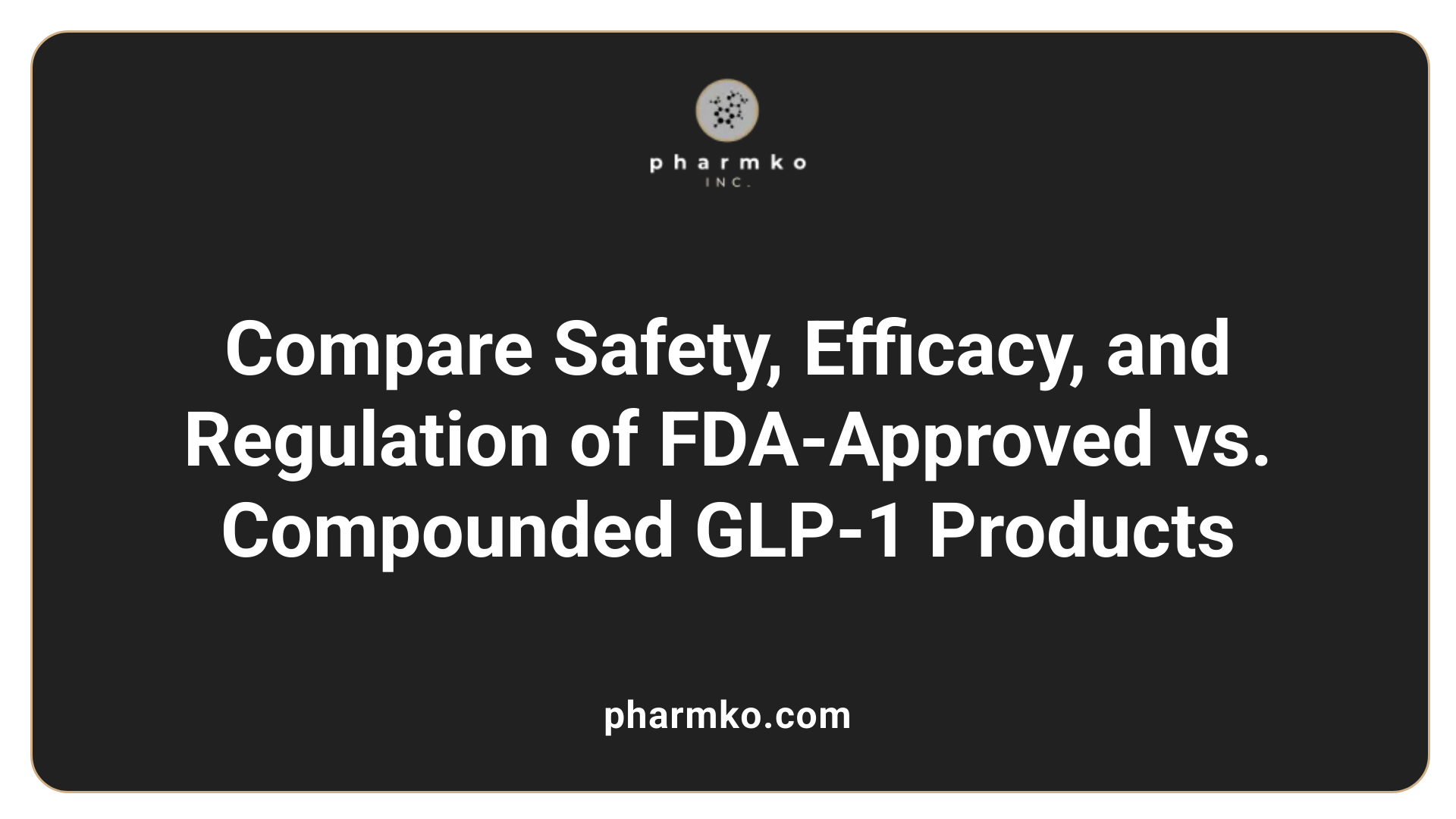
How does compounded semaglutide compare to FDA-approved options like Wegovy or Ozempic?
Compounded semaglutide is not approved by the FDA and does not undergo the extensive clinical testing that FDA-approved drugs like Wegovy and Ozempic have. FDA-approved medications are carefully formulated and manufactured under strict quality standards to ensure safety and effectiveness.
Wegovy and Ozempic are produced by reputable pharmaceutical companies, with each batch tested for potency, purity, and consistent dosing. They are approved for specific uses — Wegovy for weight management and Ozempic primarily for type 2 diabetes — based on comprehensive clinical trials.
In contrast, compounded semaglutide can vary significantly in formulation. It is often made in outsourcing pharmacies that are not connected to original manufacturers, and these products may contain salt forms such as semaglutide sodium or acetate, which are not well-studied or approved for human use.
Safety risks with compounded products include contamination, misbranded medications, incorrect dosing, and the possibility of counterfeit products. These issues can lead to adverse reactions, including nausea, vomiting, diarrhea, or more severe events like hospitalization.
From a regulatory standpoint, insurance coverage is generally more accessible for approved medications like Wegovy and Ozempic, as they meet FDA standards and are supported by clinical data.
Overall, patients and healthcare providers should prefer FDA-approved drugs for their proven safety, efficacy, and quality assurance. While compounded semaglutide might be used temporarily during shortages under certain guidelines, it carries notable safety concerns and lacks the reliability of FDA-approved options.
| Aspect | FDA-Approved GLP-1 Drugs | Compounded Semaglutide | Explanation |
|---|---|---|---|
| Formulation | Precisely defined and tested | Varies, often non-standard | Variability increases safety risks |
| Safety & Efficacy | Supported by clinical trials | No rigorous testing | Higher safety and efficacy with approved drugs |
| Manufacturing Standards | Strict quality control | Often unregulated | Ensures batch consistency |
| Cost & Insurance | Generally covered | Often not covered | Approved drugs have better insurance support |
| Regulation | Fully approved and monitored | Not FDA-approved | More safeguards with approved products |
Patients are encouraged to consult healthcare providers about the safest and most effective options for their treatment needs, especially considering the risks associated with compounded GLP-1 receptor agonists.
Risks and Safety Issues Related to Unregulated Compounded GLP-1 Products
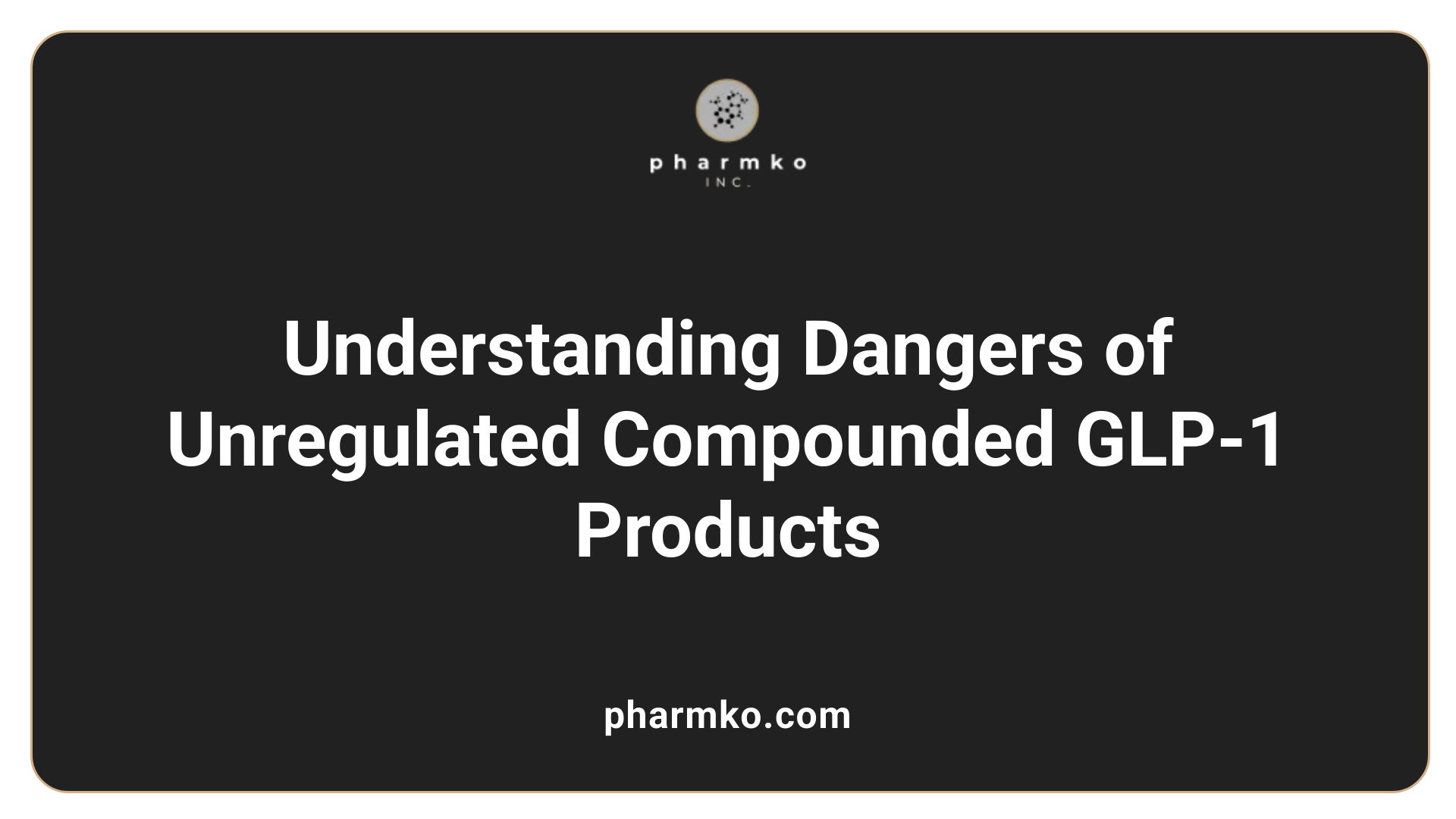
What are the risks associated with unregulated compounded GLP-1 products?
Unregulated compounded GLP-1 products carry serious safety concerns because they are not reviewed or approved by the FDA for safety, effectiveness, or quality. Unlike approved medications, these compounded drugs are produced in pharmacies that are not connected to original manufacturers and often lack proper regulation.
One major risk is contamination or adulteration, which can lead to infections or serious health issues. Additionally, compounded GLP-1s might contain different salt forms, like semaglutide sodium or acetate, whose effects are not well established and may be unsafe.
Dosing errors are another critical concern. Because these products are often mismeasured or misused—with doses taken more frequently or in higher amounts than recommended—they can cause adverse events such as nausea, vomiting, diarrhea, abdominal pain, constipation, or more severe outcomes like hospitalization and pancreatitis.
The absence of regulatory oversight means these drugs may be mislabeled or contain harmful ingredients. The risk escalates with the presence of counterfeit products and illegal online sales of unverified medications. Patients who use these unapproved products expose themselves to potential toxicity, ineffective treatment, and serious health complications.
In summary, while compounded GLP-1 products may seem like convenient alternatives during shortages, their potential to cause severe health issues necessitates sourcing only from licensed pharmacies and under medical supervision. Safety depends on using FDA-approved medications to ensure efficacy and minimize risks of adverse events, contamination, and mislabeling.
Regulatory and Legal Framework Surrounding Compounded GLP-1 Drugs
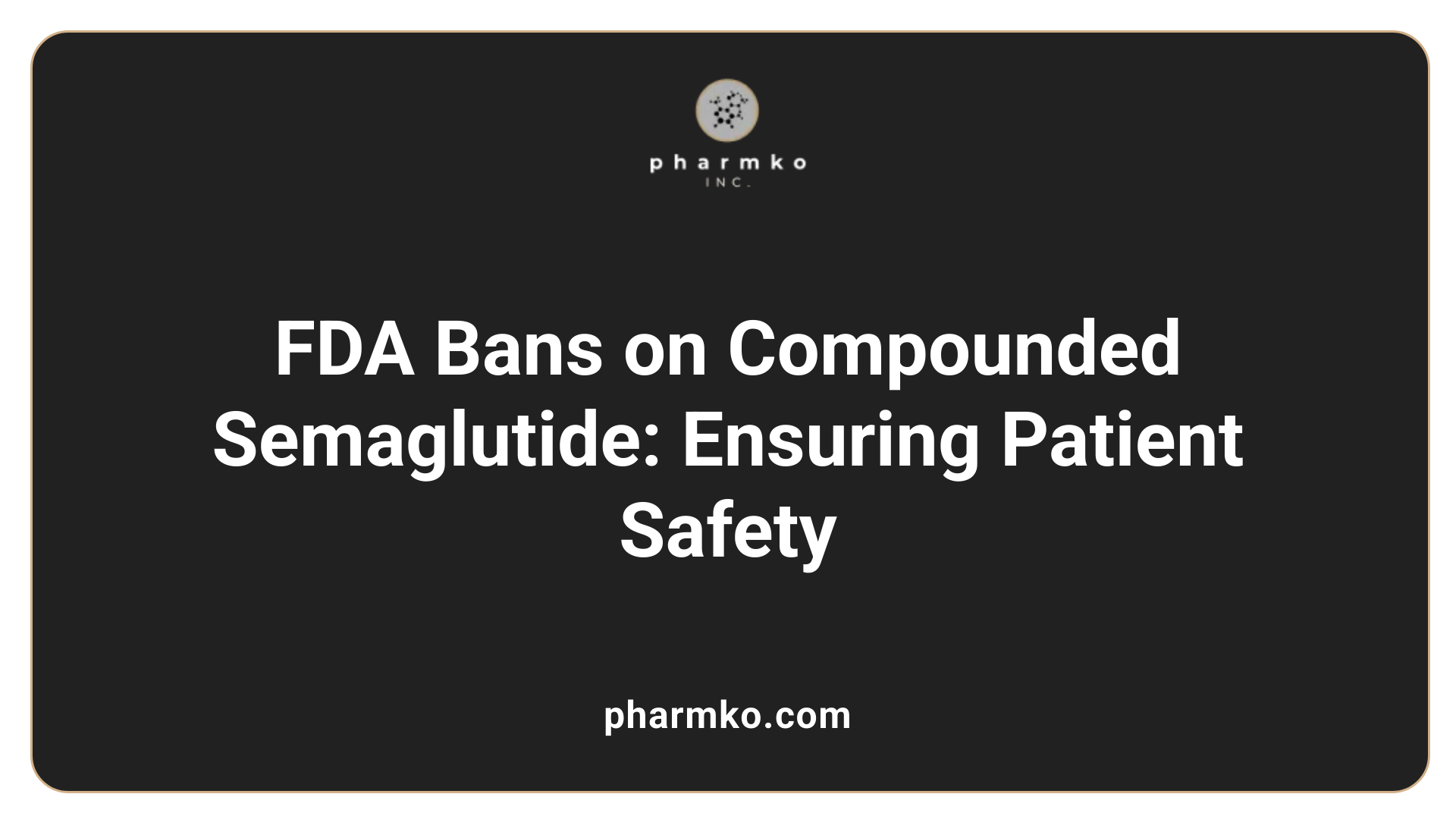
Why are compounded semaglutide products being banned?
The FDA has taken a firm stance against compounded versions of semaglutide and other GLP-1 drugs used for weight loss. These products are not approved by the FDA and do not undergo the same safety, effectiveness, or quality reviews as legally marketed medications.
Compounded GLP-1 products are typically made in outsourcing pharmacies that are not connected to the original drug manufacturers. This means they lack the regulatory oversight that ensures proper dosing, contamination control, and ingredient verification.
There are significant safety concerns, including reports of adverse events such as nausea, vomiting, diarrhea, and more severe hospitalizations, often due to incorrect measurement or administration errors. Some compounded products incorporate salt forms like semaglutide sodium or acetate, whose properties are not well established or approved.
Illegal online sales and counterfeit products pose another danger. These fake products may contain harmful ingredients, incorrect dosages, or contaminants. In fact, the FDA has identified counterfeit Ozempic and warns consumers to avoid purchasing from unverified sources.
While the FDA provides guidelines to manage drug shortages, including temporary allowances for compounded GLP-1 medications, this does not eliminate safety risks. The production and sale of unapproved compounded drugs remain illegal, and patients are urged to obtain medications only from licensed pharmacies.
The overall purpose of these regulations and bans is to shield patients from serious health risks associated with unregulated compounds, counterfeit drugs, and inconsistent quality in compounded GLP-1 products. These measures are part of ongoing efforts to ensure drug safety and efficacy.
Guidelines for Healthcare Providers and Pharmacists
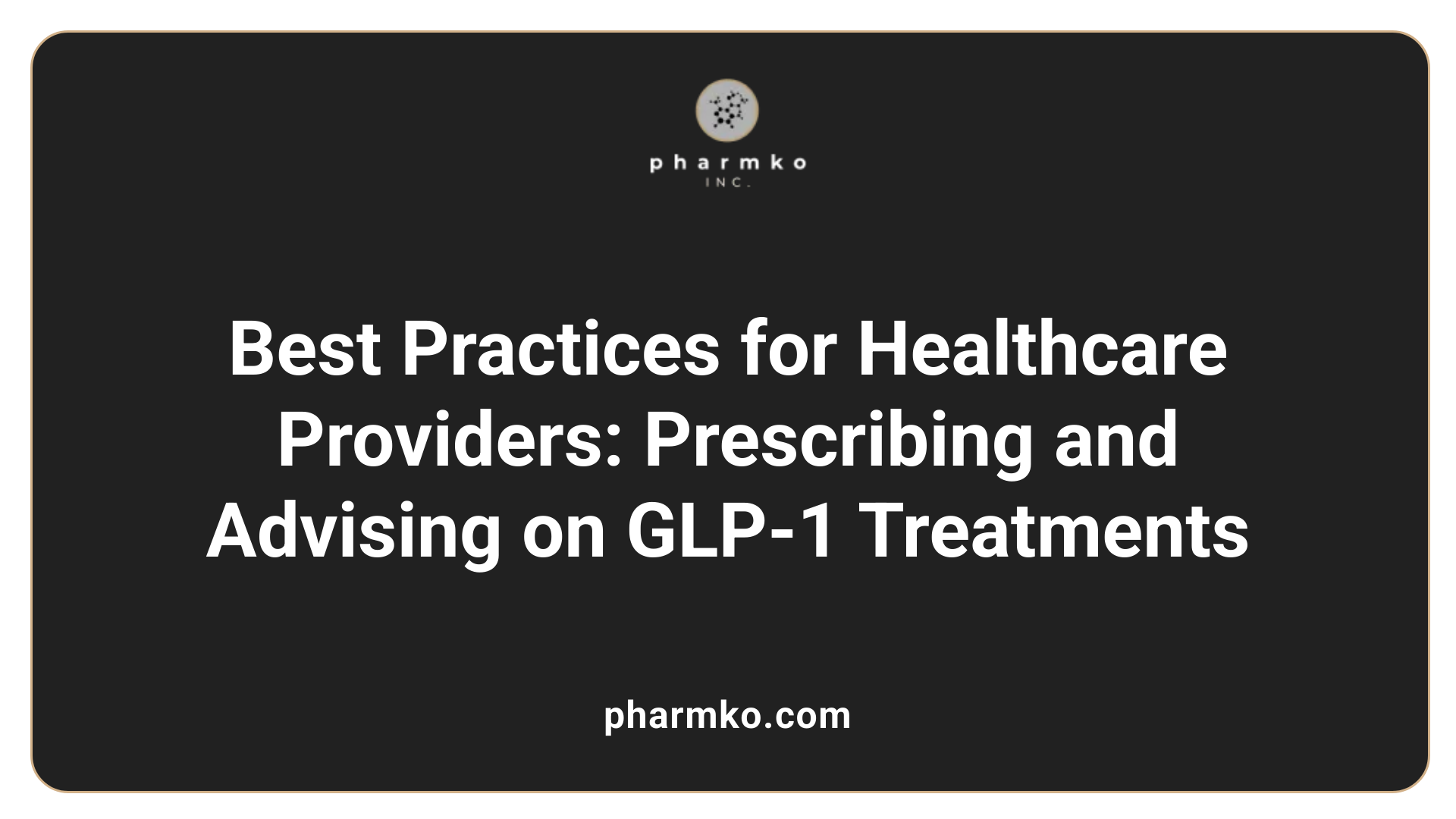
What should healthcare providers consider when using or recommending compounded GLP-1 medications?
Healthcare providers should exercise caution and prioritize prescribing FDA-approved GLP-1 drugs for weight management or diabetes, due to concerns about safety, efficacy, and lack of regulatory oversight for compounded products. It is essential to verify the credentials of compounding pharmacies, ensuring they are properly licensed, registered with the FDA, and follow good manufacturing practices.
Since compounded GLP-1 products are not reviewed by the FDA, their quality and ingredient sources can vary widely. Some compounds may contain salt forms such as semaglutide sodium or acetate, which are not well studied or approved for medical use. This variability increases the risks of adulteration, incorrect dosing, and contamination.
Numerous safety alerts from the FDA highlight reports of adverse events, including serious reactions requiring hospitalization, often caused by dosing errors or misuse of compounded drugs. These include taking higher doses than recommended, more frequent injections, or faster titration, all leading to symptoms like nausea, vomiting, and abdominal pain.
To mitigate risks, healthcare providers should-
- Carefully verify pharmacy credentials and look for FDA registration and accreditation.
- Discuss with patients the potential dangers of using compounded GLP-1 drugs, especially during shortages.
- Consider legal and safety restrictions, as compounding certain medications like retatrutide is not allowed under federal law.
- Keep informed about current shortages and FDA guidelines for use during these periods.
In all cases, transparent communication with patients about the possible risks and the importance of sourcing medications from legitimate pharmacies is vital to ensure safety.
The Role of Oversight and Public Guidance by Health Authorities
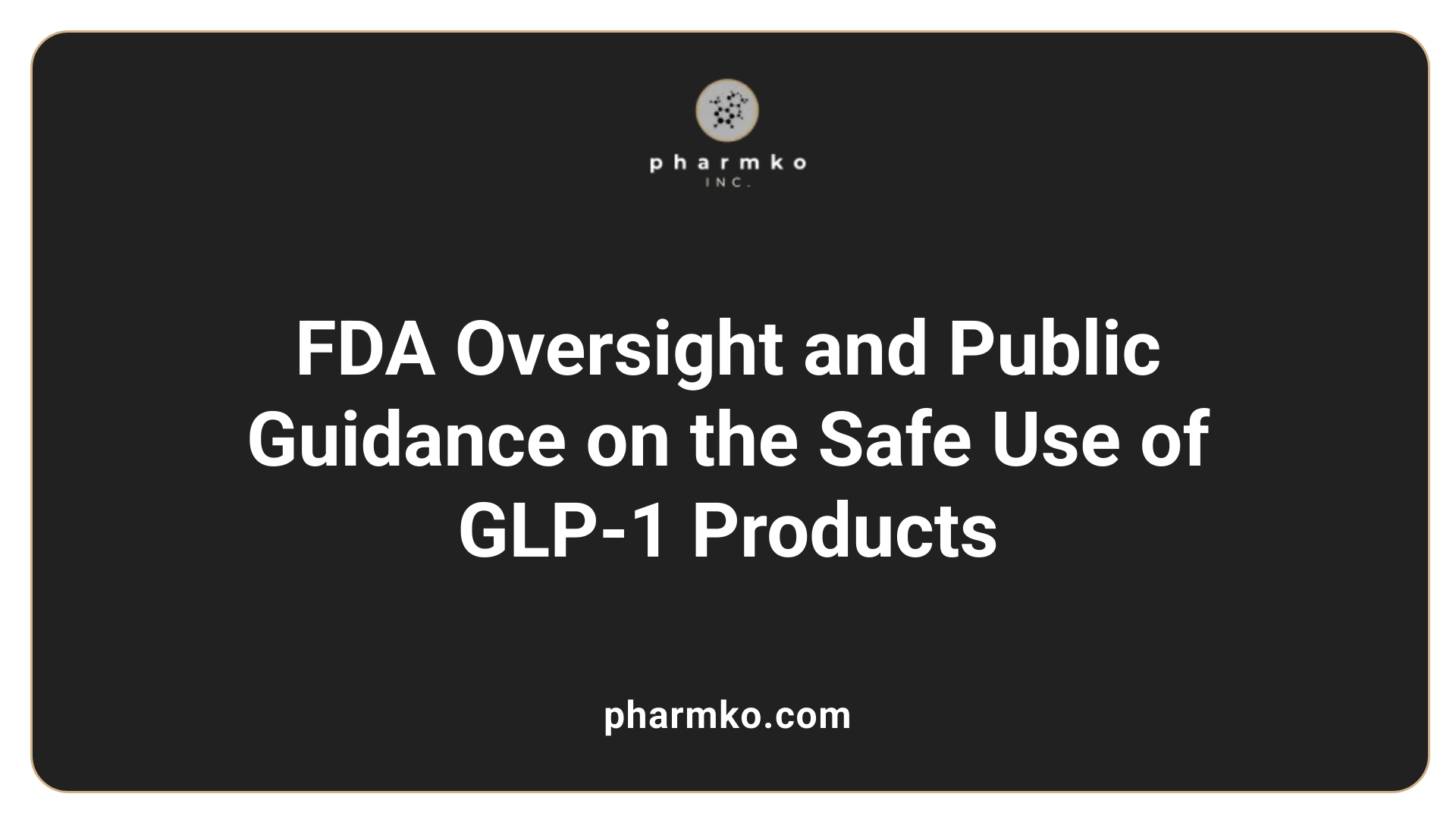
Monitoring safety reports
The FDA closely tracks adverse events and safety concerns related to compounded GLP-1 receptor agonists like semaglutide and tirzepatide. As of April 30, 2025, there had been 520 reports involving compounded semaglutide and 480 for compounded tirzepatide. These reports often include serious health issues such as hospitalizations and, in some cases, deaths, mainly due to dosing errors or the use of unapproved formulations.
The reports highlight risks like incorrect measurements, taking higher doses than recommended, or faster titration, all leading to symptoms like nausea, vomiting, diarrhea, and abdominal pain. The FDA’s careful monitoring helps ensure that potential health threats are identified quickly to protect the public.
Providing public safety guidance
The FDA actively offers guidance to both healthcare providers and consumers on the safe use of GLP-1 drugs. They warn against purchasing compounded versions from unverified sources, particularly online, due to the high likelihood of counterfeit or contaminated products. The agency emphasizes buying only from licensed pharmacies and explains the risks associated with drugs that are not FDA-approved.
During drug shortages, the FDA issues enforcement discretion guidelines, allowing limited compounding of medications like semaglutide and tirzepatide under specific conditions to help meet patient needs. However, they strongly advise that these compounded drugs are not substitutes for approved, FDA-reviewed products and should be used only under medical supervision.
Impact of FDA warnings and enforcement
The FDA has issued multiple warnings and taken enforcement actions against illegal practices associated with compounded GLP-1 receptor agonists. They have identified numerous counterfeit products sold online that may contain harmful ingredients or incorrect dosages.
While the agency has historically used reactive measures, recent regulatory adjustments reflect a more structured approach during shortages, allowing certain compounded medications under strict conditions. As of May 22, 2025, enforcement efforts have sharpened, and pharmacies are expected to cease compounding these drugs unless they meet very particular exceptions under law.
This comprehensive oversight aims to prevent unsafe practices, reduce adverse events, and ensure that patients receive safe, effective, and legitimate treatments.
| Aspect | Description | Details |
|---|---|---|
| Safety Monitoring | Tracks adverse doctor reports | 520 semaglutide, 480 tirzepatide as of April 2025 |
| Public Guidance | Advises on procurement | Only licensed pharmacies, avoid counterfeit products |
| Regulatory Impact | Warnings & enforcement | Tightens restrictions, halts unauthorized compounding since May 2025 |
Ensuring Safe and Informed Use of GLP-1 Medications
In light of the serious safety concerns, legal restrictions, and regulatory guidance, healthcare providers and patients must prioritize the use of FDA-approved GLP-1 products. The risks associated with compounded, unregulated versions—including dosing errors, contamination, and counterfeit products—highlight the importance of sourcing medications solely from licensed pharmacies and adhering to established clinical guidelines. Vigilance and education remain essential in the responsible management of weight-related therapies to safeguard patient health and uphold regulatory standards.
References
- FDA's Concerns with Unapproved GLP-1 Drugs Used for ...
- Marketing and Safety Concerns for Compounded GLP-1 ...
- Compounded Weight Loss Medications: What are They ...
- FDA clarifies policies for compounders as national GLP-1 ...
- Clinicians, Pharmacists Should Work to Ensure Safety ...
- FDA's Concerns with Unapproved GLP-1 Drugs Used for ...
- FDA clarifies policies for compounders as national GLP-1 ...
- What Patients Need to Know About the GLP-1 FDA Policy ...













